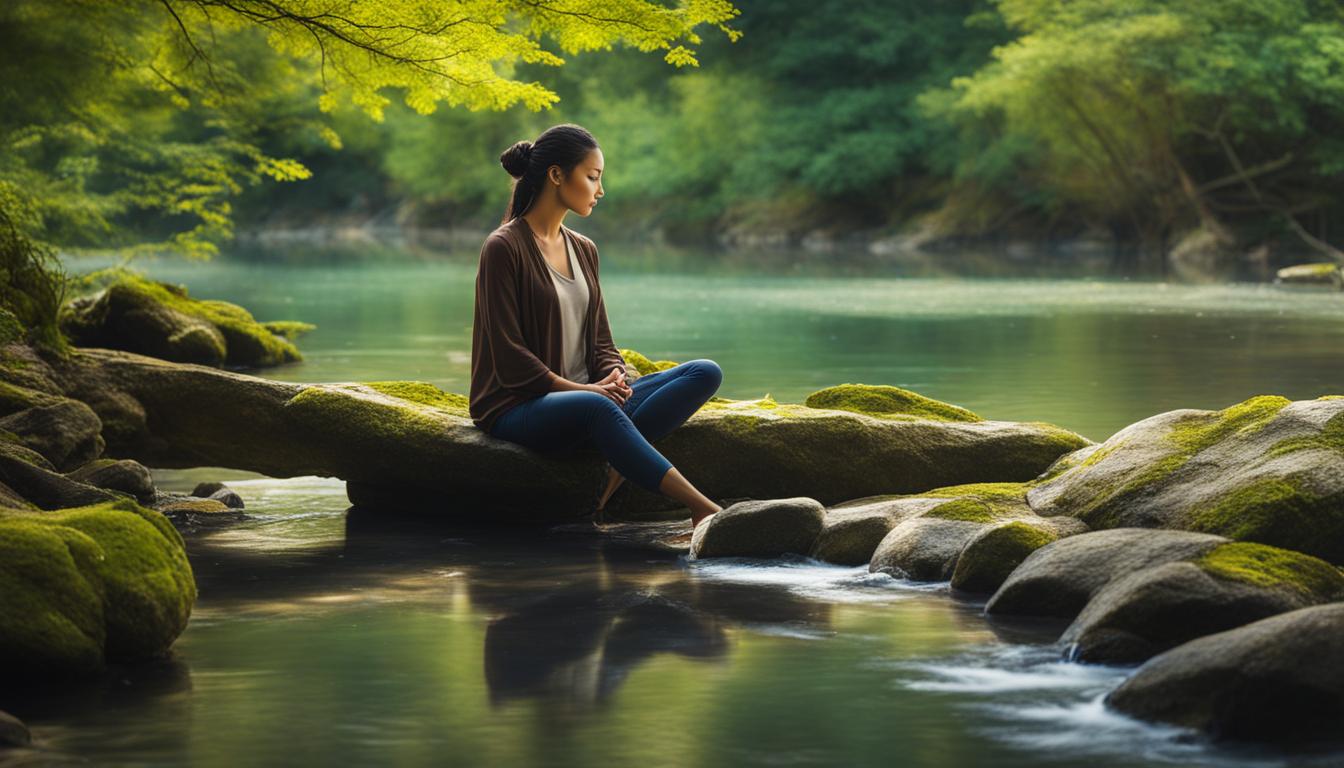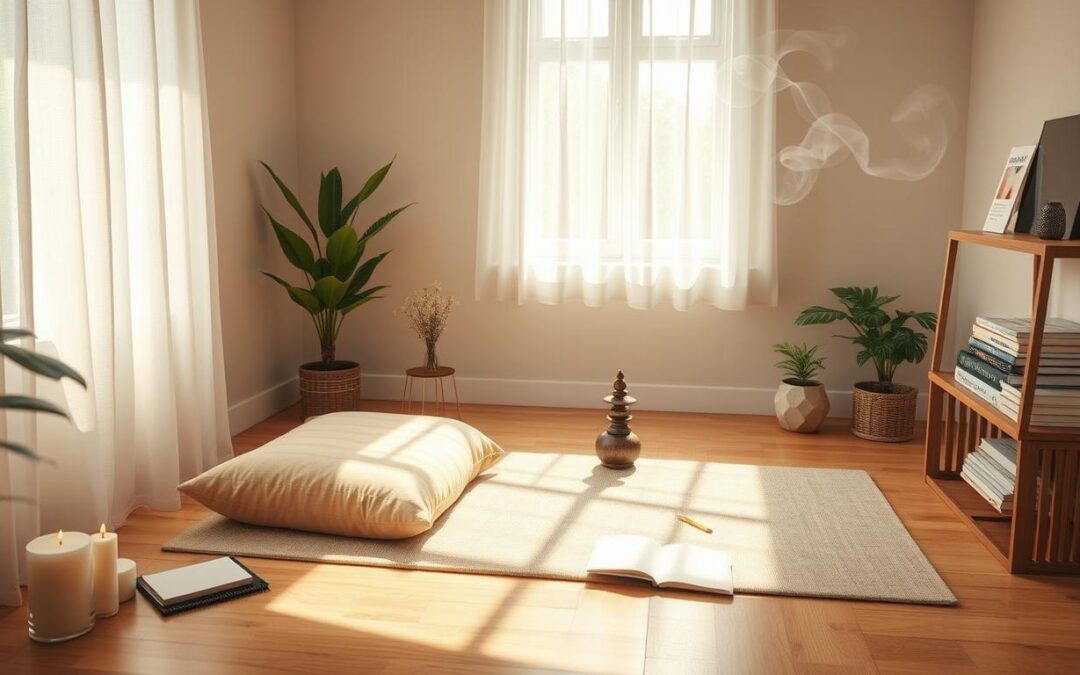Achieving inner peace is crucial for our mental and physical well-being. In a world filled with busyness and chaos, finding inner peace may seem like an elusive goal.
However, by prioritizing our mental health and adopting certain techniques, we can unlock the serenity that lies within us.
In this guide, we will explore various strategies and practices that can help you in your journey towards inner peace.
From mindfulness and gratitude to meditation and self-care, you will discover the keys to cultivating a peaceful mindset and nurturing your soul.
We will also delve into the importance of releasing emotional baggage, building harmonious relationships, and living in the present moment through mindfulness.
Key Takeaways:
- Finding inner peace is crucial for our overall well-being
- Prioritizing mental health and adopting techniques can unlock serenity
- Practices such as mindfulness, gratitude, and meditation can help cultivate a peaceful mindset
- Releasing emotional baggage and building harmonious relationships contribute to inner peace
- Living in the present moment through mindfulness enhances inner peace
The Road Less Traveled: Finding Inner Peace
Amidst the hustle and bustle of life, finding inner peace may seem like a daunting task. However, with the right techniques and mindset, you can embark on a journey towards serenity and tranquility.
It begins by taking the road less traveled, exploring practices that promote mindfulness and gratitude.
Mindfulness is the practice of being fully present in the moment and observing your thoughts and emotions without judgment. By incorporating mindfulness into your daily life, you can cultivate a sense of inner peace.
Start by setting aside a few minutes each day to engage in mindful activities such as breathing exercises, meditation, or simply being aware of your surroundings.
Embrace the Power of Gratitude
Another powerful tool in finding inner peace is gratitude. By focusing on the positive aspects of your life, you can shift your perspective and cultivate a sense of contentment.
Take a moment each day to reflect on what you are grateful for, whether it’s the love and support of your loved ones, the beauty of nature, or the simple joys in life.
The journey towards inner peace is unique for each individual. It requires patience, self-reflection, and a willingness to explore new practices. As you embark on this journey, remember to be kind and gentle with yourself.
Embrace the road less traveled and discover the transformative power of finding inner peace.
Mindfulness Techniques for Inner Peace
| Technique | Description |
|---|---|
| Meditation | Practice focused breathing and mental relaxation to cultivate mindfulness and inner peace. |
| Yoga | Combine physical movement, breath control, and meditation to promote mindfulness and enhance well-being. |
| Journaling | Express your thoughts and emotions on paper to gain clarity, release stress, and foster self-awareness. |
| Gratitude Practice | Regularly express gratitude for the people, experiences, and blessings in your life to foster a positive mindset and inner peace. |
By incorporating these mindfulness techniques into your daily routine, you can pave the way towards finding inner peace. Remember, the journey may have its ups and downs, but the road less traveled often leads to the most profound and transformative experiences.
Cultivating Calm: Creating a Peaceful Mindset
When it comes to achieving inner peace, cultivating a peaceful mindset is crucial. By practicing certain techniques and adopting positive habits, you can create a serene state of mind that promotes tranquility and emotional well-being.
Practicing Gratitude
“Gratitude turns what we have into enough.”
One powerful way to cultivate a peaceful mindset is by practicing gratitude. Taking time each day to reflect on the things you are grateful for can shift your focus from negativity to positivity.
Whether it’s through a gratitude journal, verbal affirmations, or simply acknowledging the small blessings in your life, expressing gratitude helps to foster inner peace.
Meditation for Inner Peace
“Meditation is the key to unlocking the door to inner peace.
Another effective technique for cultivating inner peace is meditation. By setting aside dedicated time for meditation, you allow yourself to quiet the mind, let go of distractions, and connect with your inner self.
Inner peace meditation practices, such as mindfulness meditation or loving-kindness meditation, can help you find calmness, reduce stress, and develop a deeper sense of inner peace.
Engaging in Self-Care
“Self-care is not selfish. It is essential for your well-being.”
Engaging in self-care activities is vital for creating a peaceful mindset. Making time for activities that bring you joy, whether it’s practicing yoga, taking a walk in nature, reading a book, or indulging in a soothing bath, helps to recharge your mind and body.
Prioritizing self-care promotes a sense of inner peace and allows you to better handle life’s challenges.
Avoiding Negativity
“Protect your peace. Remove negativity from your life.”
One aspect of cultivating a peaceful mindset is consciously avoiding negativity. This can include limiting your exposure to negative news, toxic relationships, or engaging in negative self-talk.
Surrounding yourself with positive influences and focusing on uplifting thoughts and experiences helps to create an environment conducive to inner peace.
By incorporating these practices into your daily life, you can cultivate a peaceful mindset and pave the way for achieving inner peace.
Remember, inner peace is a journey, and it is important to be patient and kind to yourself as you work towards finding serenity amidst life’s challenges.

Nurturing the Soul: Connecting with Your Inner Self
As we navigate through the complexities of life, it’s crucial to take the time to nurture our soul and establish a deep connection with our inner self. This connection is the key to finding inner peace and happiness.
Through various practices and activities, we can cultivate this connection and embark on a journey of self-discovery and serenity.
Mindfulness is a powerful tool that can help us connect with our inner self. By being fully present in the moment and observing our thoughts and emotions without judgment, we can gain valuable insights into our inner world.
Mindfulness meditation, breathing exercises, and engaging in activities that bring us joy can all contribute to fostering this connection and nurturing our soul.
Journaling is another effective practice that can deepen our connection with our inner self. By putting our thoughts and feelings onto paper, we create a space for self-reflection and self-expression.
Through journaling, we can gain clarity, explore our emotions, and uncover meaningful insights about ourselves. It allows us to develop a deeper understanding of our values, desires, and aspirations.
Engaging in self-care activities is also vital for nurturing the soul and finding inner peace. Taking the time to prioritize our well-being and indulge in activities that bring us joy and relaxation can recharge our spirit and nourish our inner self.
Whether it’s practicing yoga, going for a walk in nature, or enjoying a warm bath, self-care allows us to honor ourselves and cultivate a deep sense of self-love and compassion.
Practices for Nurturing the Soul
| Practice | Description |
|---|---|
| Mindfulness | Being fully present in the moment and observing thoughts and emotions without judgment |
| Journaling | Putting thoughts and feelings onto paper for self-reflection and self-expression |
| Self-care activities | Engaging in activities that promote well-being and relaxation |
By incorporating mindfulness, journaling, and self-care activities into our lives, we can strengthen the connection with our inner self, nurture our soul, and foster a profound sense of inner peace and happiness.
Letting Go: Releasing Emotional Baggage
When it comes to finding inner peace, one of the most important steps is learning to let go of emotional baggage that weighs us down. Holding onto past hurts, grudges, and negative experiences can prevent us from experiencing the serenity we desire.
Releasing this emotional baggage allows us to create space for positive emotions and experiences, paving the way for inner peace and personal growth.
One effective way to release emotional baggage is by recognizing and acknowledging our emotions. It’s important to give ourselves permission to feel and process these emotions without judgment.
Writing them out in a journal can be a therapeutic way to release pent-up feelings and gain clarity. Talking to a trusted friend, family member, or therapist can also provide valuable support and perspective.
Another powerful tool for finding inner peace is practicing forgiveness. Holding onto resentment and anger towards others only perpetuates negativity within ourselves.
By practicing forgiveness, we can free ourselves from the burden of carrying grudges and find peace within.
Meditation can be a helpful practice in letting go of negative emotions and cultivating forgiveness, as it allows us to observe our thoughts and emotions without attachment.
In conclusion, letting go of emotional baggage is a crucial step in finding inner peace.
By recognizing and acknowledging our emotions, writing them out, talking to someone, and practicing forgiveness and meditation, we can release the weight of the past and create space for peace and serenity in our lives.

Techniques for Letting Go of Emotional Baggage
| Technique | Description |
|---|---|
| Recognize and acknowledge emotions | Take time to identify and validate your emotions, allowing yourself to fully experience them. |
| Write it out | Journaling can be a therapeutic way to release pent-up emotions and gain clarity. |
| Talk to someone | Sharing your feelings with a trusted friend, family member, or therapist can provide support and perspective. |
| Practice forgiveness | Let go of resentment and anger towards others, freeing yourself from the burden of carrying grudges. |
| Meditation | Use meditation as a tool to observe and let go of negative emotions, cultivating forgiveness and inner peace. |
Harmony in Relationships: Building Peaceful Connections
Building harmonious relationships is essential for achieving inner peace. It is through peaceful connections with others that we can create a sense of harmony and serenity in our lives.
By prioritizing peace in our relationships, we can cultivate a positive environment that fosters growth, understanding, and emotional well-being.
The Importance of Active Listening
One key aspect of building peaceful connections is practicing active listening. It involves fully engaging with the other person, giving them your undivided attention, and seeking to understand their perspective.
Active listening promotes empathy, fosters effective communication, and enhances the quality of our relationships. By truly listening to others, we can create a safe space for open dialogue and nurture a deep sense of connection and understanding.
Cultivating Empathy and Forgiveness
Empathy is another crucial element in building peaceful connections. It is the ability to put ourselves in someone else’s shoes and understand their emotions and experiences.
By cultivating empathy, we can develop a greater sense of compassion, which allows us to navigate conflicts with understanding and kindness. Additionally, practicing forgiveness can help release resentment and promote healing within relationships.
Letting go of grudges and offering forgiveness not only benefits others but also contributes to our own inner peace.
Prioritizing Peace in Relationships
To build and maintain peaceful connections, it is important to prioritize peace in our relationships. This involves setting boundaries, expressing our needs and concerns, and actively working towards resolution and harmony.
It means choosing empathy and understanding over anger or judgment, and fostering an environment of love, respect, and acceptance.
By making peace a priority, we can create strong and meaningful relationships that bring us joy and support our journey towards inner peace.

The significance of inner peace
Inner peace is not just a temporary state of mind; it is a transformative journey that has a profound impact on our overall well-being. Here are some key significance of inner peace:
- Emotional well-being: Inner peace provides emotional stability, helping us better manage stress, anxiety, and negative emotions. It allows us to experience greater joy, happiness, and contentment in our everyday lives.
- Mental clarity: When we are at peace within ourselves, our minds are free from clutter and distractions. This enables us to think more clearly, make better decisions, and maintain focus on what truly matters.
- Improved physical health: Inner peace is closely linked to our physical well-being. It reduces the harmful effects of chronic stress, enhances our immune system, and promotes healthy habits that contribute to a balanced lifestyle.
- Self-discovery and personal growth: Cultivating inner peace allows us to connect with our inner selves, facilitating self-reflection, self-awareness, and personal growth. It empowers us to uncover our true desires, passions, and purpose, leading to a more fulfilling life.
Ultimately, inner peace is a state of being that enables us to navigate life’s challenges with grace and equanimity. It is a precious gift we can give ourselves, and through our own journey towards inner peace, we can inspire and uplift those around us.
How do you get inner peace?
When it comes to achieving inner peace, there are various techniques and practices that can help you on your journey.
Mindfulness meditation is a powerful tool that allows you to cultivate awareness of the present moment, letting go of stress and worries.
By simply focusing on your breath and observing your thoughts without judgment, you can create a sense of calm and tranquility within.
Yoga is another effective practice for finding inner peace. Through the combination of physical postures, breathing exercises, and meditation, yoga helps release tension from both the body and mind. It promotes relaxation, self-reflection, and a deep connection with yourself.
Self-reflection and gratitude are also essential in cultivating inner peace. Taking the time to journal and reflect on your thoughts and emotions can bring clarity and help you let go of negativity.
Additionally, expressing gratitude for the small blessings in your life can shift your focus from what’s lacking to what you have, fostering a sense of contentment and peace.
Lastly, incorporating positive affirmations into your daily routine can transform your mindset and bring inner peace.
By repeating positive statements about yourself and your life, you can rewire your subconscious mind and replace negative thoughts with empowering ones. This practice helps you build self-confidence, resilience, and a positive outlook on life.
Conclusion
“Project Serenity” is a comprehensive program that offers a holistic approach to personal growth and well-being, guiding individuals towards finding and achieving inner peace.
The journey towards inner peace may seem daunting, but with the right techniques and practices, it is absolutely attainable.
By incorporating mindfulness into our daily lives, we can cultivate a peaceful mindset and learn to live in the present moment. Mindfulness meditation, breathing exercises, and engaging our senses can help us find serenity in the chaos of our busy lives.
Self-reflection and self-care are vital components of the journey towards inner peace. Practices like journaling, gratitude, and positive affirmations nourish the soul and help us connect with our inner selves.
Letting go of emotional baggage and nurturing harmonious relationships also contribute to our overall well-being and inner peace. Remember, achieving inner peace is a lifelong endeavor.
It requires patience, consistency, and an open mind. Embrace the power of “Project Serenity” and its encompassing techniques to embark on a transformative journey towards inner peace, self-discovery, and personal happiness.
FAQ
What is the importance of inner peace?
Achieving inner peace is crucial for our mental and physical well-being. It promotes emotional resilience and personal growth, fosters meaningful relationships, and offers clarity and serenity amidst life’s challenges.
How can I find inner peace in a busy life?
Prioritizing your mental health and incorporating practices like mindfulness, meditation, self-care, and avoiding negativity can help cultivate a peaceful mindset and ultimately achieve inner peace.
What practices can help me connect with my inner self and nurture my soul?
Practices like mindfulness, journaling, and engaging in self-care activities can help you connect with your inner self and nurture your soul, leading to inner peace and happiness.
How can I release emotional baggage and find inner peace?
Recognizing and acknowledging your emotions, writing them out, talking to someone, practicing forgiveness, and engaging in meditation can help you release emotional baggage and find inner peace.
How can I build peaceful connections in relationships?
Practicing active listening, cultivating empathy, forgiving and letting go, and prioritizing peace in relationships can build harmonious connections and contribute to inner peace.
How can I incorporate mindfulness into my daily routine?
Starting your day with intention, practicing mindful breathing, and engaging your senses can help incorporate mindfulness into your daily routine and achieve inner peace.
What is the definition of inner peace?
Inner peace is a perpetual state that influences thoughts, emotions, and actions. It is a state of clarity and serenity that promotes emotional well-being and personal growth.
How do I achieve inner peace?
You can achieve inner peace by practicing techniques such as mindfulness meditation, yoga, self-reflection, gratitude, breathing exercises, journaling, and positive affirmations.
What is “Project Serenity”?
“Project Serenity” is a comprehensive program that offers a holistic approach to personal growth and well-being, guiding individuals towards inner peace through mindfulness, self-reflection, and positive practices.









